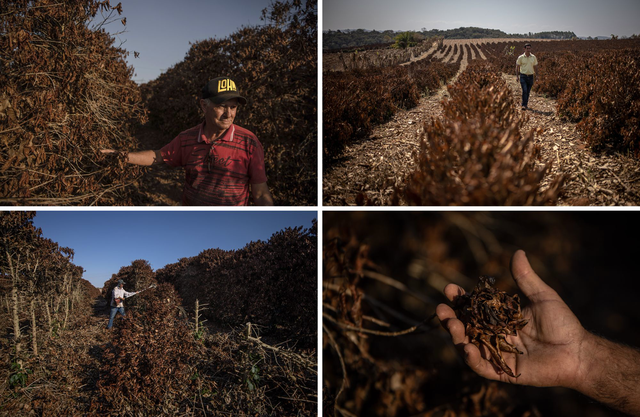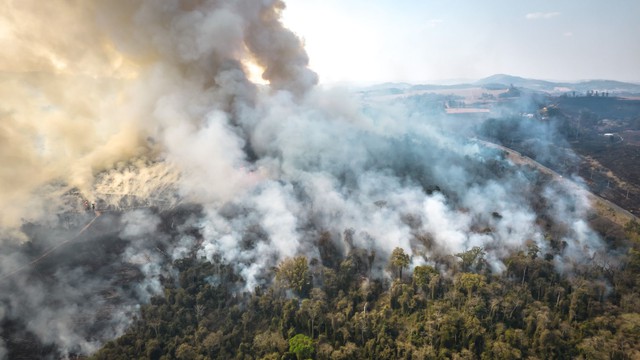Climate change situation
Scientists predict that rising global temperatures and reduced soil moisture will gradually devastate agricultural lands in Brazil and much of the rest of the world. “It’s a vicious cycle. There’s no rain because there’s no humidity and no humidity because there’s no rain,” said Marcelo Seluchi, a meteorologist at Brazil’s Center for Disaster Warning and Monitoring.
He said ranchers clearing the Amazon forest to raise livestock and grow crops are pushing the situation further and further away. By his calculations, Brazil has not had a normal rainy season since 2010.
There are also transboundary droughts in Argentina and in Chile, Canada, Madagascar, Mexico and Russia. America was split into two states this summer. The West has been ravaged by record heat waves, wildfires and droughts so severe that huge lakes and rivers are drying up and depleting hydroelectric power. In the East, at the same time, has been flooded by tropical storms and deadly floods on record.
Crop yield declines
According to a recent study published in the Journal of Environmental Economics and Management, these will lead to a 10% decrease in crop yields over the next three decades, while the global population is expected to decline. increased by more than 1/5.
The devastation in Brazil offers a glimpse into the future. Drought and frost have damaged crops on an area of 1.5 million square kilometers – an area the size of Peru. The coffee losses are staggering at best. Brazil predicts its coffee production will fall by more than 25% this year. Accordingly, up to half a billion coffee beans were destroyed, enough to brew all Americans every morning for a period of 4 months.
Challenges for coffee companies
This has posed a challenge among the world’s largest coffee retailers, such as Starbucks Corp. and Nestle SA, to ensure supply.
“The competition is pretty fierce. Starbucks said in a statement that it always buys beans months in advance,” said Jack Scoville, a trader at commodity brokerage Price Futures Group in Chicago. Meanwhile, Mark Schneider, Nestle’s CEO, told investors during a conference call in July that the company would protect its finances by buying hedging policies. long-term early next year”.
Heavy impact on the global commodity market
Farms scattered across the vast plains and plateaus above the Atlantic coast produce four-fifths of orange juice, half of sugar, and one-third of coffee for export. , and a third of soybeans and corn are used to raise egg-laying hens, as well as other livestock. So when the region’s crops scorched and then froze this year due to climate change, global commodity markets shook.
Arabica coffee prices jumped 30% in six days at the end of July, orange juice rose 20% in three weeks and sugar prices hit a 4-year high in August. Soaring prices are contributing to the increase. international food inflation, worsening the financial situation during the pandemic and forcing millions of low-income families to reduce spending.
Food shock, food
Emerging markets bear the brunt of rising food prices. However, Scoville warns that successful price fixing does not mean there will be enough coffee in the long run. He predicts the loss of revenue in Brazil will affect the market for many years. People who normally only buy coffee beans from Brazil and Vietnam are inclined to suddenly move elsewhere to try to make up the shortfall.
That is exactly the situation Bader Olabi, an Istanbul coffee roaster, finds himself in. He is looking for new suppliers in Colombia, India and Africa to replace the 100 barrels of coffee beans he orders from Brazil each year. Olabi knows it will not be easy to convince customers that other coffees are also good, while he himself says: “Brazilian coffee is the best”.
Lose everything when the frost comes
Antonio Ribeiro Goulart was shocked when a total of about 11,000 trees across the farm turned from vibrant green to dull brown in a 24-hour period. Just run your hand slowly through the withered branches, the leaves will crackle and then crumble into small pieces.

Goulart’s family has owned the land for over a century. He inherited the farm from his father and settled down after spending about three decades at Banco Bradesco. In 2019, he accepted to deliver part of this year’s crop to a supplier who sold him a new lawn mower, but now that’s not possible.
Goulart will have no harvest this year or next. Even the 2023 crop is almost certain to be lost. Perhaps he would have to call the supplier and renegotiate the terms. And then, like thousands of farmers around him, he planned to cut down all the branches on every tree in the hope that the trunks would sprout new shoots in the spring. If this does not happen, he will have to cut down the tree and start from scratch.
Drought makes the situation increasingly unpredictable
It is now the seventh month of the drought, too harsh for a good crop. The soil moisture is only 20%. Ademar Pereira, head of the local coffee growers association, says the ideal humidity is around 60%.
Pereira pointed to all the signs of drought: manicured lawns that had turned into brown carpets, the scorch marks left by a recent wildfire in a distant mountain, and a water reservoir. electricity in the valley has water so low that the bottom can be seen faintly.

Brazil’s wildfires have razed farms, destroying the lands of one of the world’s largest agricultural producers.
One July day, Cleverson Bertamoni watched his cornfields smoke in a town called Nova Mutum, which lies along the outer edge of Brazil’s rainforest.
Bertamoni frantically filled two water trucks and took them outside to put out the fire. However, the fire is still spreading. Bertamoni had to call for help. His neighbors rushed to fill more than 13 trucks with water. About six hours later, the fire was finally extinguished, more than 100 hectares were destroyed.
For Bertamoni, the fire was very different from the times he had encountered since he was a boy who followed his parents into their corn and soybean fields. The ground is very dry now, he said, so a small spark is enough to trigger a forest fire and the fire spreads very quickly.
After the fire, Bertamoni calculated that he was short of 16,000 bags of corn for traders in Sao Paulo. The contract stipulates that he must pay more than 120,000 USD, but he does not have that much money. Therefore, he made an agreement with them to pay more than 20,000 bags in the next year’s harvest. Bertamoni felt that he had found his way to life in the dead. He hopes everything will be fine, just the rains will come and the harvest will be bountiful.
Refer to Bloomberg
